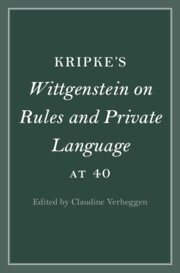Book contents
- Kripke’s Wittgenstein on Rules and Private Language at 40
- Cambridge Philosophical Anniversaries
- Kripke’s Wittgenstein on Rules and Private Language at 40
- Copyright page
- Dedication
- Contents
- Contributors
- Acknowledgments
- Introduction
- 1 Kripke’s Wittgenstein’s Skepticism about Rules and Meaning
- 2 Putting Wittgenstein Back into Kripkenstein:
- 3 Answering Kripke’s Skeptic
- 4 Wittgensteinean Notions of Uniformity and Kripkensteinean Skepticism
- 5 Wittgenstein’s Naturalism and the Skeptical Paradox
- 6 Kripke and Wittgenstein on Rules and Meaning
- 7 Semantic Normativity, Properly So Called
- 8 What Is the Skeptical Problem? Wittgenstein’s Response to Kripke
- 9 How Not to Brush Questions under the Rug
- 10 Quadders and Zombies
- 11 Communitarianism, Interpersonalism, and Individualism in Kripke’s “Skeptical Solution”
- 12 “Considered in Isolation”
- 13 The Meaning of Meaning Ascriptions
- Bibliography
- Index
6 - Kripke and Wittgenstein on Rules and Meaning
Published online by Cambridge University Press: 22 February 2024
- Kripke’s Wittgenstein on Rules and Private Language at 40
- Cambridge Philosophical Anniversaries
- Kripke’s Wittgenstein on Rules and Private Language at 40
- Copyright page
- Dedication
- Contents
- Contributors
- Acknowledgments
- Introduction
- 1 Kripke’s Wittgenstein’s Skepticism about Rules and Meaning
- 2 Putting Wittgenstein Back into Kripkenstein:
- 3 Answering Kripke’s Skeptic
- 4 Wittgensteinean Notions of Uniformity and Kripkensteinean Skepticism
- 5 Wittgenstein’s Naturalism and the Skeptical Paradox
- 6 Kripke and Wittgenstein on Rules and Meaning
- 7 Semantic Normativity, Properly So Called
- 8 What Is the Skeptical Problem? Wittgenstein’s Response to Kripke
- 9 How Not to Brush Questions under the Rug
- 10 Quadders and Zombies
- 11 Communitarianism, Interpersonalism, and Individualism in Kripke’s “Skeptical Solution”
- 12 “Considered in Isolation”
- 13 The Meaning of Meaning Ascriptions
- Bibliography
- Index
Summary
I read Kripke’s sketches of our ordinary view of meaning in his book Wittgenstein on Rules and Private Language as attempts to highlight the features of meaning that enable us to draw the distinction between what seems right and what is right. I argue that Kripke thinks the best way to clarify these features of meaning is to describe metasemantic conditions that a speaker’s words must satisfy if the speaker is to be warranted in asserting a sentence in which the words occur. Although the view of meaning I attribute to Kripke is initially compelling, I argue that it rests on a subtle yet fundamental misunderstanding of the distinction between what seems right and what is right.
Keywords
- Type
- Chapter
- Information
- Kripke's Wittgenstein on Rules and Private Language at 40 , pp. 107 - 123Publisher: Cambridge University PressPrint publication year: 2024

